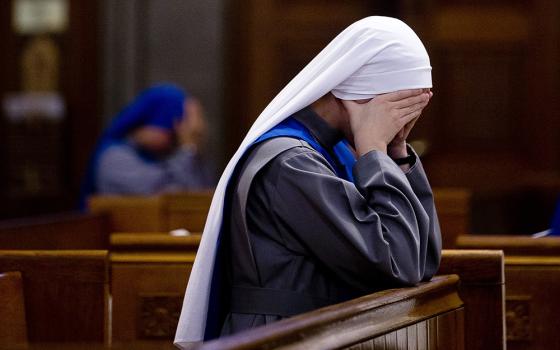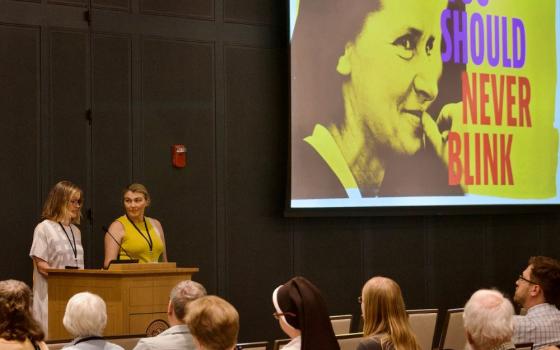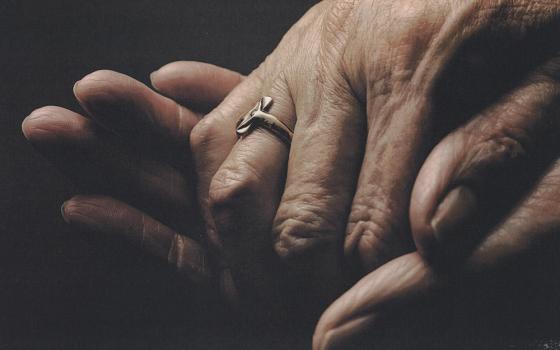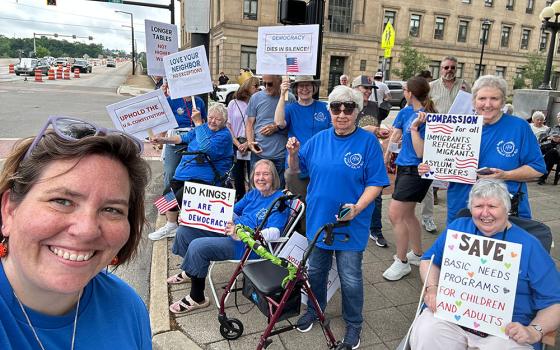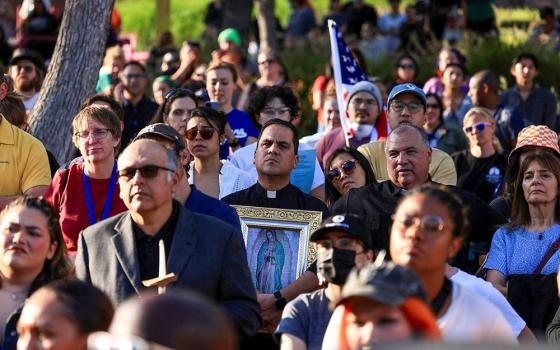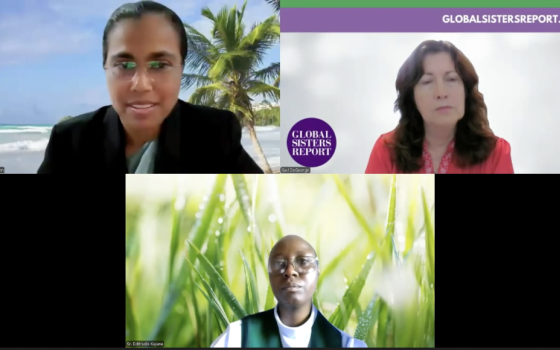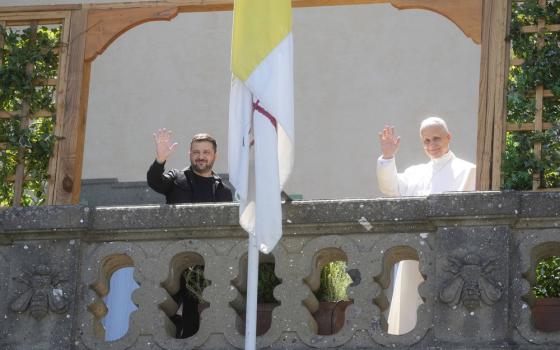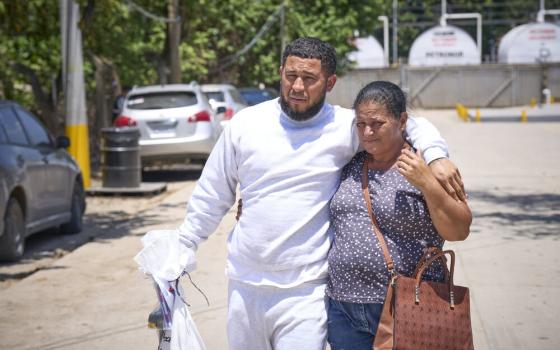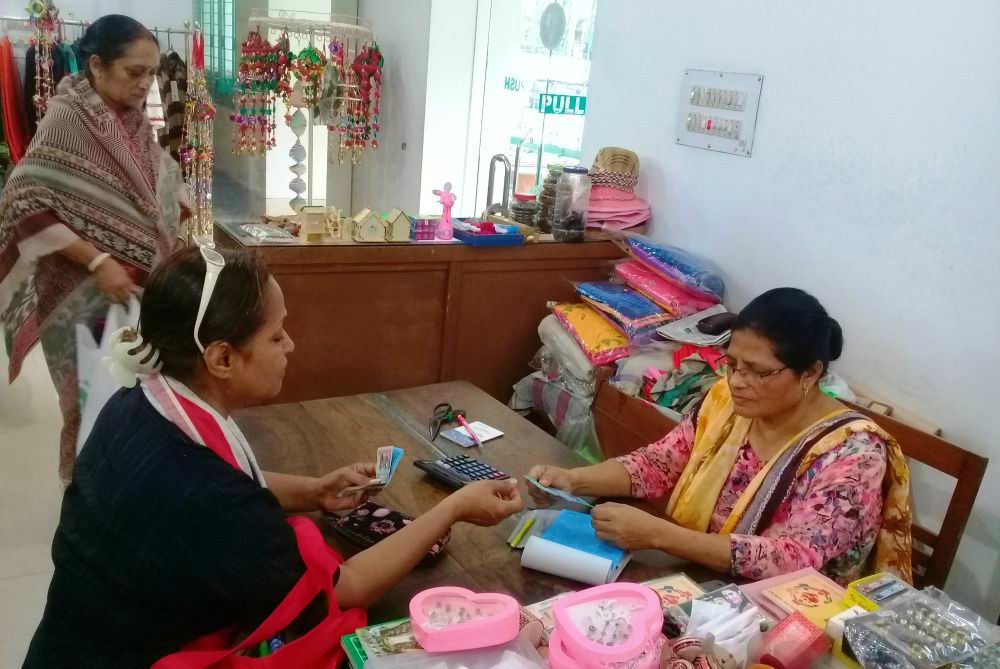
Fardusy Haq, 55, left, buys some goods from the Jagorani Training Center showroom in Tejgaon, Dhaka, Bangladesh. (Sumon Corraya)
Shimul Cruze entered Jagorani (Awaking) Training Center with a smile on her face, carrying a bag of jute products. She handed it to Sister Mary Lillian of the Associates of Mary Queen of Apostles, a local community, and received a payment for her work in return.
"Today, I submitted my work and got a salary. I am pleased," Cruze, 55, told Global Sisters Report.
Jagorani, as it is known, is a showroom and training center Sister Mary Lillian runs in Dhaka. At the center, over 3,000 needy rural women make and sell jute products, terracotta figurines, woven baskets, candles, rings, earrings, hand-painted squares, rugs, wooden trays, handbags, and garments to become self-reliant and empowered. Most of the women (80%) are Hindu, Muslim and Buddhist.
Cruze said the training center transformed her life.
"I was unemployed. I could not maintain our family on my farmer husband's solo income," she said. Thanks to Sister Mary Lillian and the center, she and her husband could afford to educate their two sons and daughter.
Cruze took a weeklong training session from Sister Mary Lillian on creating jute products in 1984.
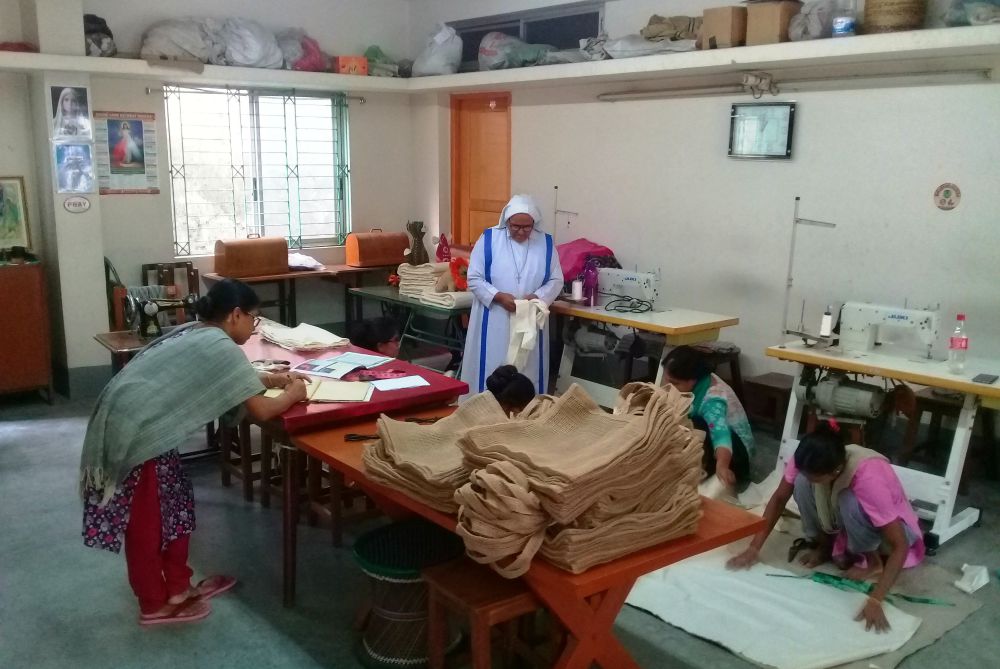
Sr. Mary Protiva works at Jagorani Training Center with her co-workers. (Sumon Corraya)
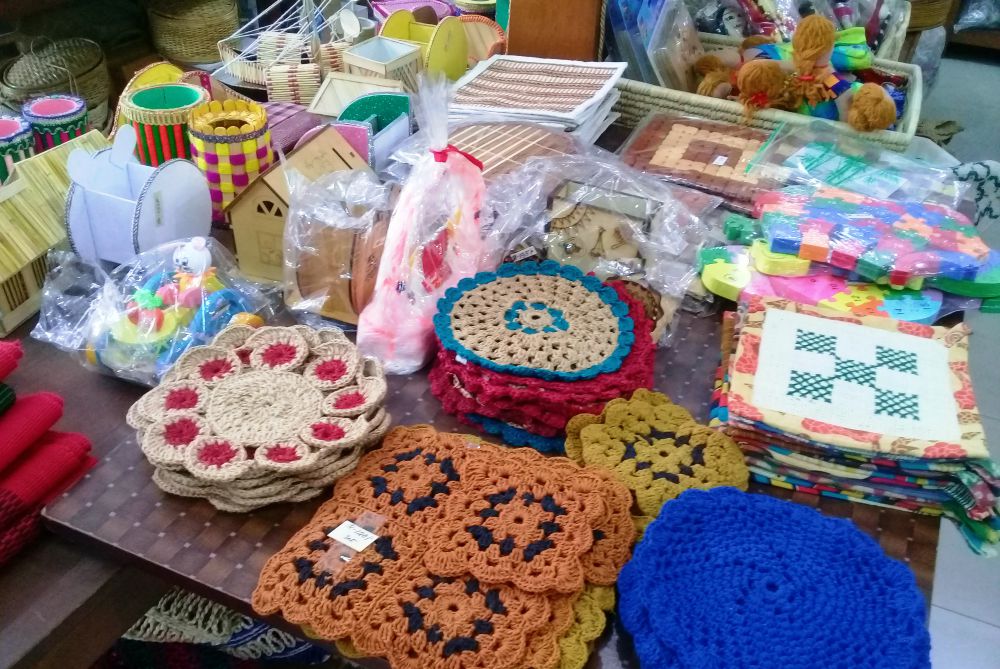
Jute products at Jagorani Training Center in Tejgaon, Dhaka, Bangladesh (Sumon Corraya)
Advertisement
"My husband makes jute product with me. He eagerly learned from me," she said. "We both work full-time at home, making jute products. We have a happy life." Together, the couple earns 8,000 taka ($95) each month from these handcrafts.
Sister Mary Lillian, 89, founder and director of Jagorani, told GSR she started the center in 1968, when a famine hit Bangladesh.
"People came to me for money. I was a young nun. If one day, I gave money, two days later, they again came for help," she said. "I thought I should do something differently. I might provide them capacity-building training. It would be like not giving them fish, but teaching them how to catch fish."
First, she learned how to make jute products. Since jute grows in Bangladesh, there was plenty to use for the crafts.
But once she trained new artisans in creating jute products, she found that buyers' interest in the handiwork was low.
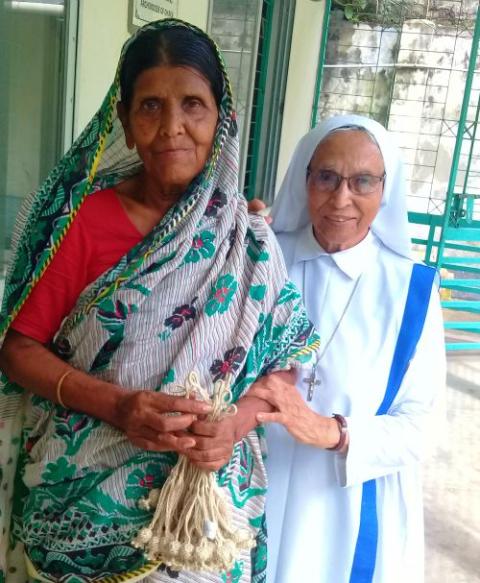
Rupu Begum, 65, left, makes jute products that she sells through the Jagorani Training Center, which was started by Sister Mary Lillian, right, in 1968. (Sumon Corraya)
"Many times, 10 to 12 artisans waited at sisters' house, and I went to sell their products. They sat till I returned from the market," she added.
Sister Mary Lillian said CORR: The Jute Works, which Caritas Bangladesh started in 1973 to help rural women provide supplemental income for their families, played a major role in helping the artisans sell their crafts in other countries.
"First, foreigners would not buy our products. They found one or two good products in a packet, but others were ruined. So they would not take any products from our country in the 1970s," she said. "But we asked them to take our products and promised we will send good, quality products."
Jute Works started to help Sister Mary Lillian and the artisans export the products, and the quality led to return customers.
Sister Mary Lillian estimated that Jagorani has trained 10,000 women since 1968. Many women start their own similar organizations after learning from Jagorani to create jobs for other women.
For her work empowering women, Sister Mary Lillian received a letter of commendation from Pope John Paul II.
"It was a big encouragement and big award," she said.
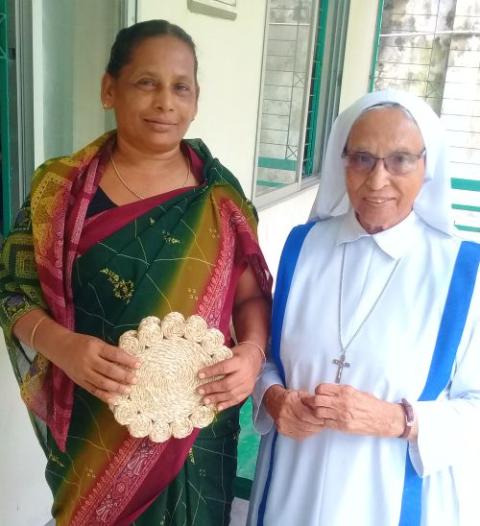
Shimul Cruze, left, with Sr. Mary Lillian. Cruze used to be a housewife who depended on her husband's income until she was trained to make jute products at Jagorani Training Center. (Sumon Corraya)
Rupu Begum, 65, made the two-hour trip to Jagorani with Cruze and their jute products. Begum and Cruze are neighbors in Gazipur, about 38 kilometers (23.6 miles) outside Dhaka.
Muslim women like Begum normally don't work outside of the home in Gazipur. But when she saw Christian women in her village earning money with skills they learned at Jagorani, she asked them to train her.
"I told them I wanted to learn, and they taught me," she said. "I became part of their group, which has Christian, Muslim and Hindu women. We all work together."
Begum said if she had not gotten involved with Jagorani, she might not have been able to provide an education for her three sons, all of whom received higher education and are established in their professions.
"In the past, I could not make decisions for my family, but after I started earning money, I could raise my voice and my husband would hear me," she said, adding she continues to be involved with Jagorani because "I love their company. They are like my relatives."
Jagorani also has eight women who work at the center, most of whom are physically challenged.
Shila Costa, who has trouble speaking, has worked at the center for nine years.
"I read at a grade-five level, and I could not continue my studies because of the poverty of my parents. I felt like a burden," she said. Jagorani taught her handicraft work and gave her a job and a place to live. She saves most of the 6,000 taka she earns each month.
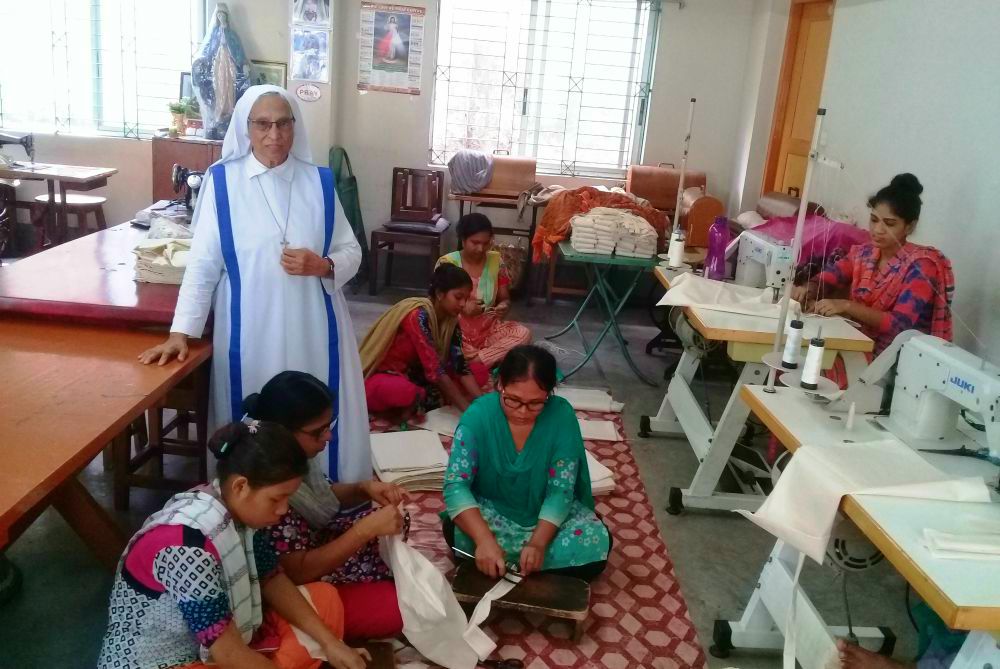
Sr. Mary Lillian of the Associates of Mary Queen of Apostles with her artisans (Sumon Corraya)
She said she enjoys her work. Each Sunday, she and her other co-workers go to a nearby Catholic church for Mass then visit a park or relatives.
"Once, I was burden. Now I can help my parents," Costa said. "They are happy for my career and a decent life."
A customer named Fardusy Haq, 55, was buying goods from the Jagorani showroom recently.
"I am a regular customer," she told GSR. "Today, I bought some jute products and cloths. I like their products for their good quality and how long they last."
Sister Mary Protiva of the Associates of Mary Queen of Apostles, assistant director of Jagorani who coordinates with artisans, lights a candle inside of her office every day.
"I light candles for well-being to God," she said. "I pray through Mary, and I get answers."
Sister Mary Protiva, who has worked with Sister Mary Lillian since 1973, said in Bangladesh, women once could not work outside the home. Jagorani provides them with an opportunity.
"Many women educated their children by working at Jagorani," she said. "Many needy Catholics involved with Jagorani have educated their children, and now some of them are becoming priests and nuns, so it also benefits the Catholic Church."
[Sumon Corraya is a Catholic journalist based in Dhaka, Bangladesh. He covers issues affecting the Christian community in Bangladesh]

